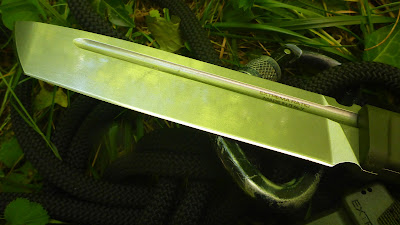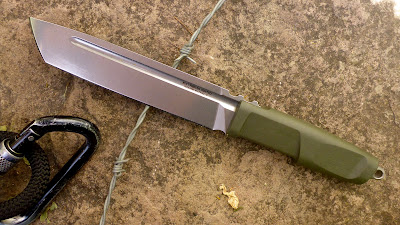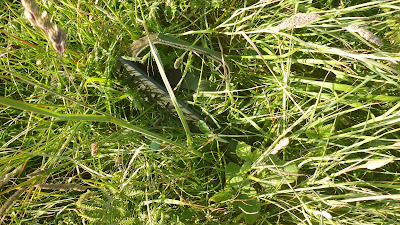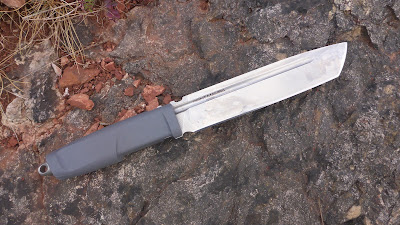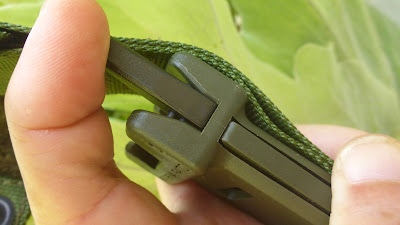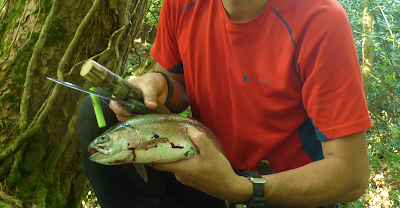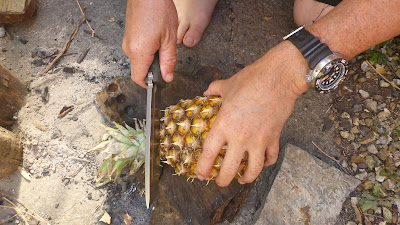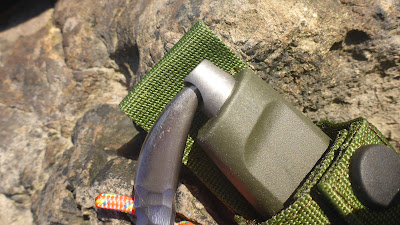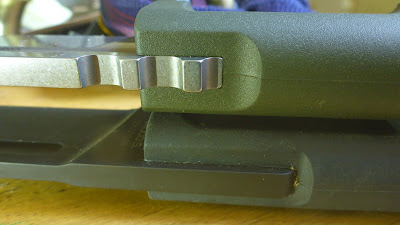GIANT MAMBA*.
A Quick Preview and first impressions by BCT.
The Giant Mamba is a heavy duty use, fixed blade of a 1/4" thickness (6.3mm) and 6.42" long (163mm).
The overall blade design is that of a modified Tanto.
Great classic blade shape
The Extrema Ratio Giant Mamba
The Extrema Ratio Giant Mamba is a knife of practical size, easy to wear with a versatile and secure carry system and a robust blade and handle design.
The Giant Mamba features a hefty spine thickness, which allows for placement of "extra" hand pressure should the occasion arise and complete confidence regarding tip and blade strength during penetration and or twisting/levering movements***.
Easily split wood if need be
As always, a knife is only as good as it's edge. We see an excellent edge finish enabling great cutting ability. The Giant Mamba is listed as a multi-purpose heavy duty field knife. Based upon my 35 years plus field experience I see no reason to doubt this company statement.
"Kore wa doko no naifu desuka"?
"Sore wa Itaria no naifu desu"!
That's right, Made in Italy!
I'm a big fan of modified Tanto blades and especially those from Extrema Ratio.
Firstly, it's just a very easy blade design to maintain the edge.
Extrema Ratio use Austrian made (from Böhler) N690 martensitic stainless tool steel. This cobalt and vanadium enriched stainless steel can be heat treated to achieve great hardness (in this case HRC 58) yielding excellent abrasion resistance with great knife edge retention. The smooth surface finishes offered by Extrema Ratio help to achieve maximum corrosion resistance with N690 and also having a hardness of HRC 58 allows for adequate percentages of Chromium to remain in solid solution to aid corrosion resistance. (Böhler, pers. comm. 2013).
I can safely say that with almost ten years experience of using knife blades made with N690, this is an excellent quality hardwearing stainless tool steel for outdoor knife manufacture.
Extrema Ratio knives are fully manufactured in Italy (the only exception is the N690 steel obtained from Austria as mentioned above).
Shown here is the chemical composition of N690 Cobalt steel as stated by the raw material manufacturer Böhler
(Image courtesy of Böhler)
Blade finishes
There are two blade finishes available for the Extrema Ratio Giant Mamba: Stone washed and Mil-C- Spec (13924) black oxide coated zero reflective blade surface finish. The black Mil Spec coating prevents reflections from the blade and is hard wearing.
The highly polished stone washed surfaces such as in the finish by Extrema Ratio, satisfy a good surface treatment (un coated) to maximise corrosion resistance for N690 stainless alloy and provides a totally food safe surface finish, which can easily be kept clean.
Ranger Green against Alpine vegetation
Whilst not a "mirror finish", their stone washing abrasive is such that a very smooth finish is obtained (see above images).
The blade profile is a full flat grind and the edges, like all Extrema Ratio products, professionally hand ground. (Convex edge)
The edges have been finished to a near mirror polish. My experience with Extrema Ratio knives is that they go to a lot of trouble to put a very nice convex edge upon their blades. No ugly grind marks are present.
The above image shows a view of the Giant Mamba's tip. What a beefy tip, and only adds confidence to what Extrema Ratio say about intended "heavy duty use".
The Giant Mamba features a very strong yet versatile tip (see cutting examples below)
You might be thinking such a knife must weigh a tonne but it doesn't, thanks to the very practical length of approximately 6.42 inches/163mm and 2 side fullers on the 1/4"/6mm spine; one ends up with a weight of around 289 grams/10.2Oz. and only 433grams/15.3Oz. combined knife and scabbard weight.
The Giant Mamba is the much bigger (and more robust by design) version of the current Mamba, light weight backup knife line.
Ranger green version seen under light shade
Ranger green version seen in full sunlight (pine and mixed alpine vegetation)
GIANT MAMBA FULL TANG CONSTRUCTION
Don't underestimate the capacity of the Extrema Ratio Giant Mamba's 6 inch blade, it's a solid tool, thanks to its clean lines and thick spine and big wide 6mm/1/4" thickness full tang.
Sturdy symmetrical tang. As a "modified Tanto", this blade therefore does not possess a guard.
Camouflage
The Extrema Ratio Giant Mamba is available in several handle and matching scabbard and leg retention band colours to help blend with numerous environmental terrains. Shown below is the "Ranger Green" version of handle and scabbard.
For example: Knife only (shown in Ranger green).
Ranger Green colouration
The following image shows the same model against vegetation. Knife is inserted in scabbard. Imaging conditions: 1 metre distance from viewer to knife, full late afternoon sun. Excellent blending for green grassy backgrounds.
Ranger Green
Desert colouration (scabbard is also Desert colour) Full sun.
Desert
HCS (Hybrid Coyote Sage): This is as the name implies a hybrid color based upon Coyote and Sage, this is a new color of the Italian Special Forces. This color is said to be good for arid regions and behaves differently under different lighting conditions.
(If you've seen my videos on the Extrema Ratio Task J then you will have already seen the HCS colour on handle of the TASK J I own).
HCS (Hybrid Coyote Sage)
HCS against dry grass/reeds (light shade)
Wolf Grey colouration
Lighting conditions: Limestone rock background, full sunny day, bright shade.
Shown in the above image (medium shade against grey limestone rock face) Giant Mamba with Wolf Grey handle option (accompanying Wolf Grey scabbard, not shown). The below image shows the same knife (also against a grey limestone) in bright shade during full daylight.
and all Black Mil Spec version (not shown-see here).
The Giant Mamba has a versatile blade shape. The modified Tanto allows easy sharpening.
An almost straight lower edge makes for easy field maintenance.
The Scabbard System (Ranger Green version reviewed here)
The thing about Extrema Ratio, is that not only do they make great knives, they don't stop at the knife. Their scabbard designs are very well thought out and provide safe and numerous mounting options within the M.O.L.L.E system, plus more (for the creative or even those who do not use M.O.L.L.E packs/vests).
In the the case of the Extrema Ratio Giant Mamba, the high impact nylon scabbard is open ended so no material can accumulate within the scabbard, such as mud, sand, water etc. The front and back venting also allows water and mud to freely drain fro these areas and hence these substances should not impede the release of the knife from this scabbard. Long term carry in high humidity regions and or long treks where ones knife may be partially submerged, this scabbard will allow for rapid drying and least chance of corrosion setting in. The Giant Mamba can be carried mounted handle down as the knife is held in very securely, yet able to be release effortlessly via one finger/thumb on the "trigger" lever.
Likewise the deployment of the Extrema Ratio Giant Mamba can easily be fast (but very secure) due to the innovative scabbard design featuring a one touch trigger release system.
Side view of "Trigger lever" showing the bulge which fits into one of the finger gimping recesses.
The trigger release can be supplied in either left or right handed release. The lever itself is held in place with two steel pins. One pin for it to pivot around and the other as a stop pin.
To release the knife, the tigger is moved towards the knife
Knife removal is very easy, it can be affected by one hand and yet the knife is held safely and securely. The upper gimping has a double function, as it provides the "notch" to where the locking lever engages. (Note if the handle is removed from the knife itself, then the knife will not remain locked in the scabbard. The handle needs to be attached to the knife in order for the locking system to function correctly).
High impact Nylon scabbard features a one finger/thumb "lever mechanism" to engage the knife safely.
To keep the knife held in a vertical position whilst on a belt, a double press stud closure is provided, which can be adjusted for left or right handed operation via reversing the velcro strap.
Construction Materials
The scabbard is made from High Impact Grade Nylon. "Impact" is a specific grade of Nylon which has extreme resistance to impact forces as the name suggests. It is a different type of Nylon usually designated "Nylon 6 Impact Grade"
To achieve these "high Impact" specifications, filler materials are used in the composition of this thermoplastic polymer.
The scabbard can simply be "hosed down" should it be contaminated in any way as there is nothing to rot or grow fungus on (eg Tropical environs), this can be done with the knife still inserted due to ample sites of drainage.
The scabbard construction also employs Nylon webbing, Velcro, elastic webbing and a high friction rubber band as part of the leg loop.
In the above image, my thumb indicates the high friction rubber banding on the leg loop.
Excellent neat stitching is apparent on all of the webbing.(below images)
Fully adjustable Velcro attachment on the leg loop. (above image) attaches at the base of the High Impact Nylon scabbard. In order to remove the M.O.L.L.E (Modular Lightweight Load carrying Equipment) strap, the leg loop must first be removed.
There is also a belt loop for waist carry (see 2 images above) and another Molle loop at the top of this webbing.
Rubber insert prevents "blade rattle"
Carry options for the scabbard are the following:
The high impact nylon sheath is versatile and can be mounted on the M.O.L.L.E. system of a tactical vest, a backpack or any other equipment both upwards or reversed.
Textile parts have been minimized and are limited to the belt and double button safety strap, and the tight strap, reinforced by a rubber band to avoid rotation. Rubber inserts in the sheath’s slots dampen the blade to avoid rattling.
The Giant Mamba, a Multi-Purpose Knife


End view of a Giant Mamba grip showing the inner seat of where the pommel rests against and hence providing adequate friction to keep the pommel attached.
All of the above Forprene qualities make for an excellent choice for a durable field product.
The Giant Mamba sits within the "Multi-purpose" knife range from Extrema Ratio
Briefly
Food preparation examples:
Easy to use for food preparation.
The Extrema Ratio Giant Mamba about to be tested out.

Gutting freshly caught trout, no problems!
Can't do this without a very sharp blade and the knife came with a deadly sharp blade out of the box!
Field Maintenance
Having a simple blade profile means an easy to maintain edge in the field. The Extrema Ratio Giant Mamba can be field stripped for cleaning without the need for any specialized tools. The Giant Mamba is also very easy to wipe clean as it has not extraneous features which can get caught up upon a cleaning rag/cloth.
A note here about "Field Maintenance" This does not mean maintenance conducted on the ground or dirt or hanging over a cliff face! Good field maintenance means working over a clean area and better still over a small mat or plastic sheet to prevent the loss of parts and or tools and to keep the area clean (after all that's why one is conducting maintenance). It means doing all, if not most of the same thing you would do in a dedicated area/room but now forced to do in the field. Finally remembering to work safely as once any knife handle is removed there is no longer a safe sure grip present to hold the blade.
The lanyard hole allows one to insert any rigid object through the hole to unscrew the pommel and therefore remove the handle to be able to clean the knife tang.
Here I use my Titanium K9 to remove the pommel. But rigid plastic will also do!
The above and below images show how easy it is to remove the pommel via any pointed instrument (anti-clockwise to remove the pommel). Once the pommel is removed (advise performing this task whilst the knife is still in the scabbard-or the blade extracted and the edge is shielded from the user). One can slide the handle off the tang very carefully, removing (do not let it drop-read above!) the small steel nut from within the knife tang, now the blade can be properly washed/cleaned- Reverse process.
One thing to note here, is that once the handle has been removed the blade can slip out of the scabbard (if you leave it there) through its base or top entrance. The reason is because the symmetry of Forprene grip at the "hilt" locates the blade centrally within the locking part of the scabbard, and if not present, the blade will shift to one side of the scabbard due to the nature of the "springiness" of the locking system.
Squeeze the scabbard as indicated in this picture and this will hold securely the knife (metal only) within the scabbard whilst handle is removed prior to and replaced after cleaning.

Just insert and rigid object into the pommel to screw it from the tang bolt
The thread is a separate part to the actual pommel, probably held in place by a permanent Loctite?
The pommel has been machined from a 300 series, low magnetic stainless steel.
The handle, made from the same Forprene material as their other knives, and also sporting that truly full sized ergonomic grip, which if you are not aware, was based upon a collaborative effort from Extrema Ratio and University scientists**** specialising in biomechanics of the human hand. However, in the case of the Giant Mamba, the handle totally encloses the 6mm thick tang and is held in place via a "screw in" pommel made from 300 L series stainless steel.
The screw down pommel means tool-less maintenance since any straight rigid object can be used to remove the pommel and thus access the tang for cleaning if the knife was to be submerged in salt or dirty water for prolonged periods.
The Modified Tanto
The Giant Mamba's blade shape is that of a modified Tanto, not only is this an aesthetic design, it is relatively easy to maintain in the field and thus an important choice for the professional on the go.
We see large well-placed finger gimping along the spine for a non slip finger or thumb placement. Let's not forget the aesthetics too.
Having a long fuller is not only useful for decreasing the knife weight (otherwise this would be one very heavy knife) but can serve another function to release air or liquid if the product is used to penetrate objects.
The Grip
When I think of Extrema Ratio as a brand, I think not just about the business end but of their handle design/s. At first glance if one is unfamiliar with them, they may appear unconventional, however any such thoughts soon disappear when you actually take hold of an Extrema Ratio knife. Their grips provide a great combination of tactility, vibration absorption and durable (virtually unbreakable**-short of chopping the grip up with an axe or throwing it into a fire!)
Upper knife, Giant Mamba, showing the smaller cutaway in the Forprene as compared with Extrema Ratio's regular ergonomic grip seen below (lower knife T4000S). Last image showing the underside of the Giant Mamba and the cutaway in the Forprene grip.
The newer 2020 grip style, in keeping with the general overall shape of the classic ergonomic Extrema Ratio Forprene grip.(Shown here the HCS version)End view of a Giant Mamba grip showing the inner seat of where the pommel rests against and hence providing adequate friction to keep the pommel attached.
Grip Material
The choice of grip material is the same for the majority of the Extrema Ratio fixed blade product line, ie Forprene.
Forprene is a TVP- Thermoplastic Vulcanizate Elastomer (sometimes known as a TPE-Thermoplastic Elastomer) is a polymer with an amazingly wide range of specifications.** here are listed just a few, applicable for use with the Giant Mamba's handle.
- Excellent Resistance to UV ageing, Ozone attack and weathering
- Operating temperature range -40°C-130°C
- Excellent resistance to deformation by returning to its normal shape, even over a wide temperature range. (also see below re Shore Hardness)
- Excellent chemical resistance including: aqueous solvents, acids and bases, detergents etc.
- High fatigue resistance
- Good abrasion resistance.
- High Shore hardnesses easily obtained which can provide excellent mechanical properties. This means the grips will not deform under extreme twisting loads.
- Good at absorbing vibration.
Ok this was just a quick taster for this new Extrema Ratio model for 2020, the Giant Mamba.
Stick around for a full on field review coming soon of the Extrema Ratio Giant Mamba on BushCampingTools!
In the meantime you can see their latest products here as well on their FaceBook page.
*A Mamba is a large deadly poisonous and very fast moving much feared snake, with a reputation of: "Formidable"!
**Data taken from So.F. TER website (since 2016 owned now by Celanese- HQed in Dallas)
**** Through the challenges associated with resolving technical issues, finding an efficient and ergonomic design and optimal operating parameter, the Facoltâ di Scienze Motorie (PG) partnership has provided innovative opportunities through the whole manufacturing process.
*** Whilst the Giant Mamba is a heftily constructed knife, it is not indestructible and is a knife first and foremost, not a pry bar, screwdriver or hammer. Any knife can be broken if undue excessive forces are applied to them.





